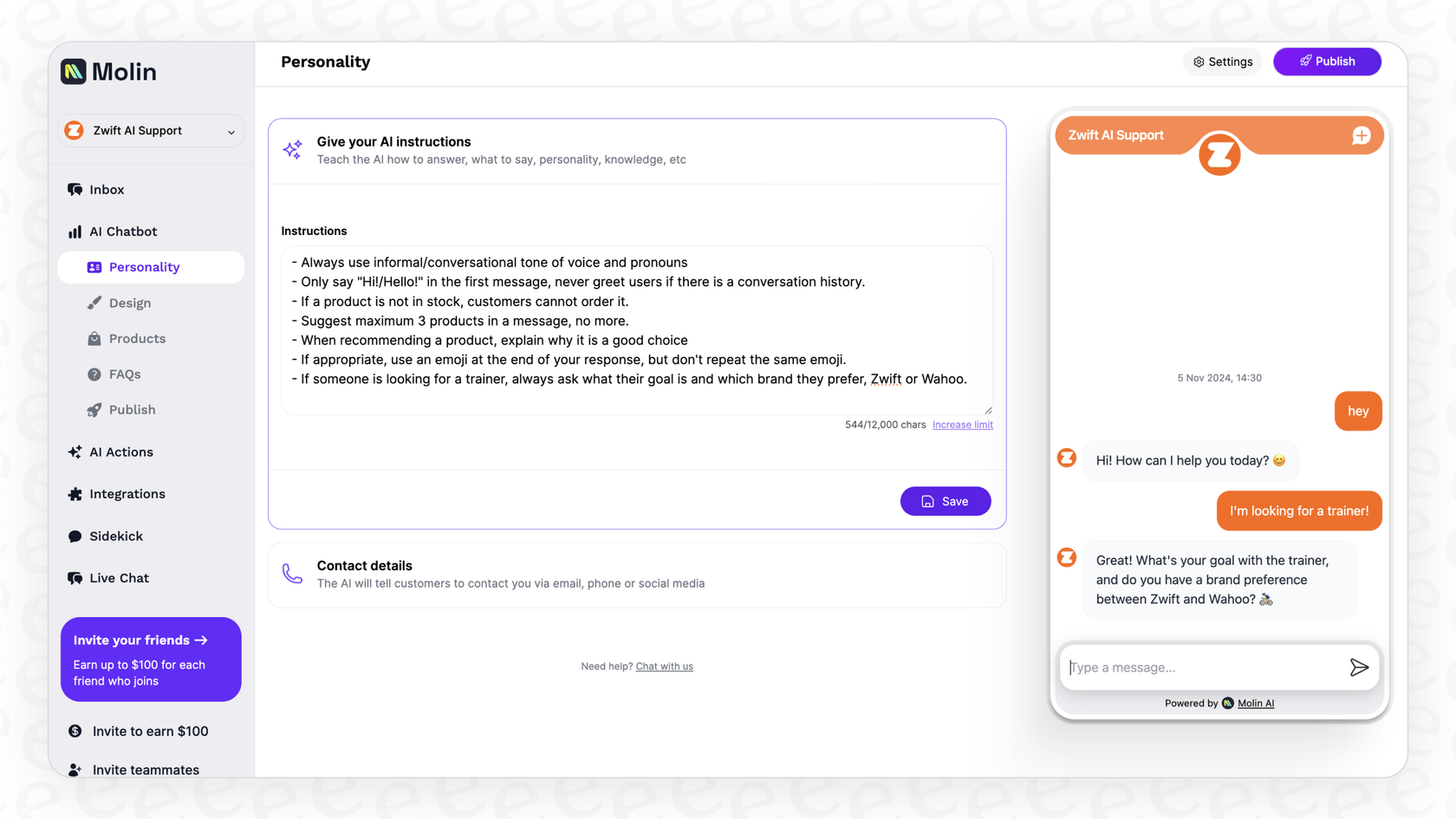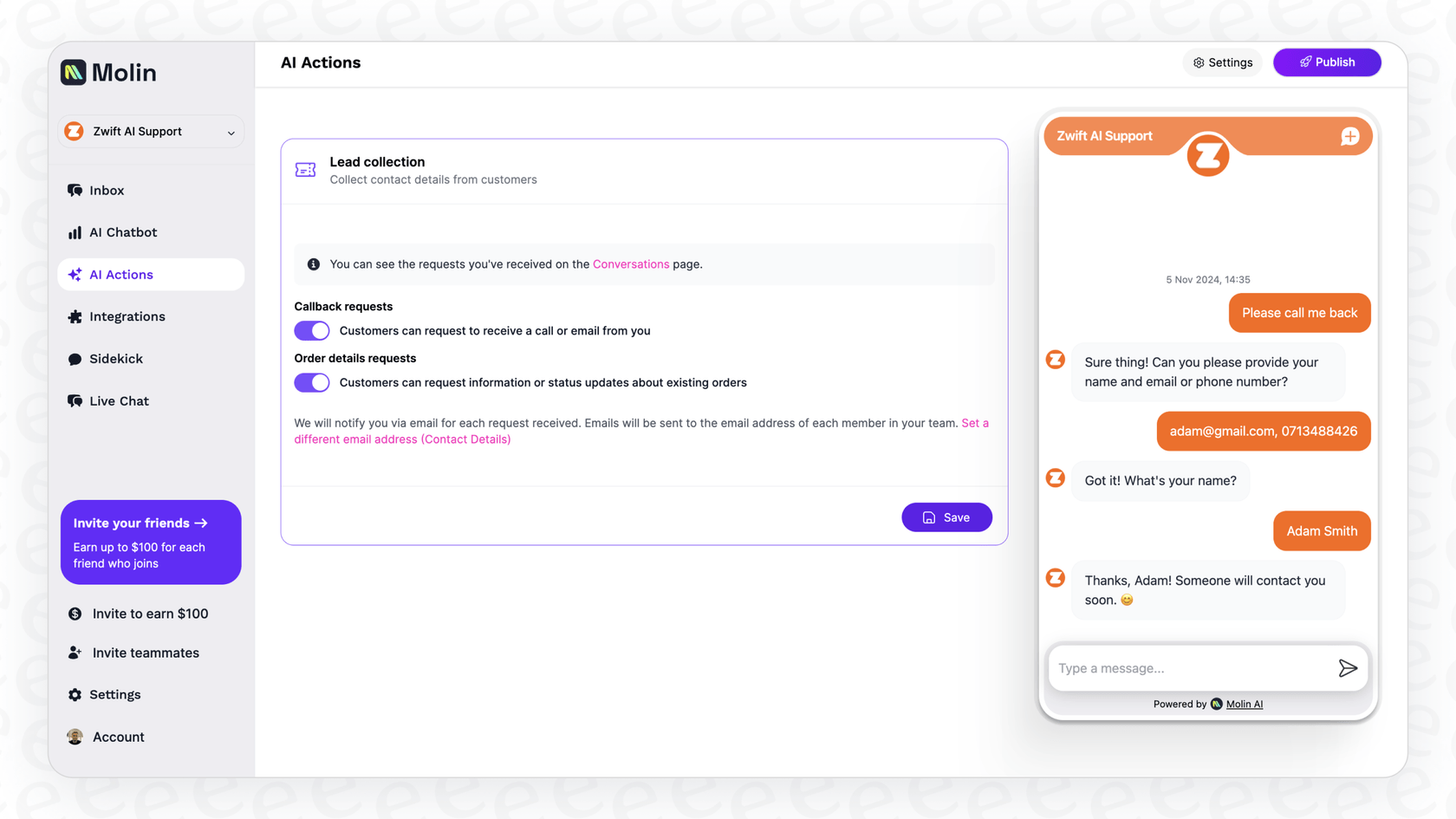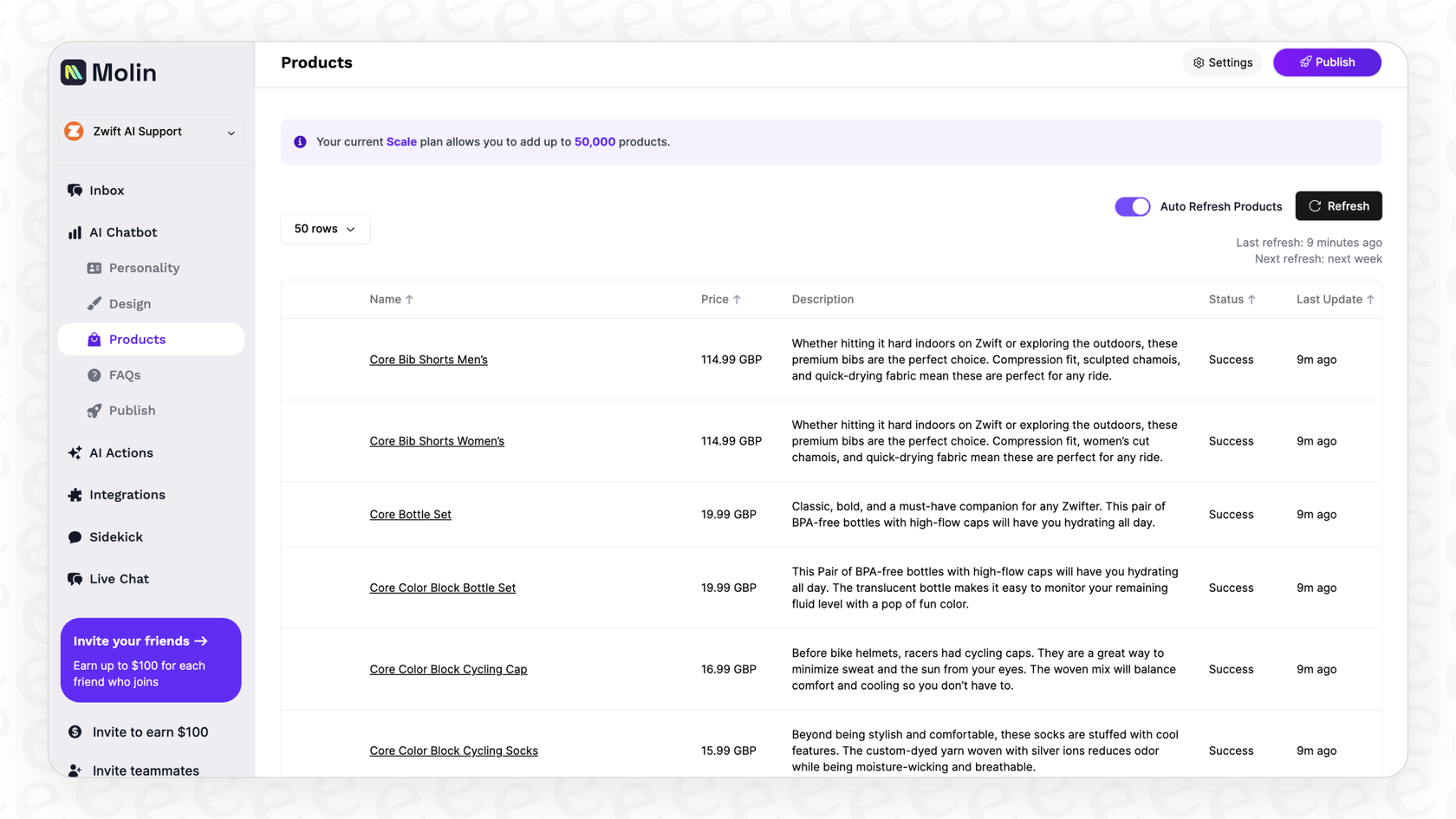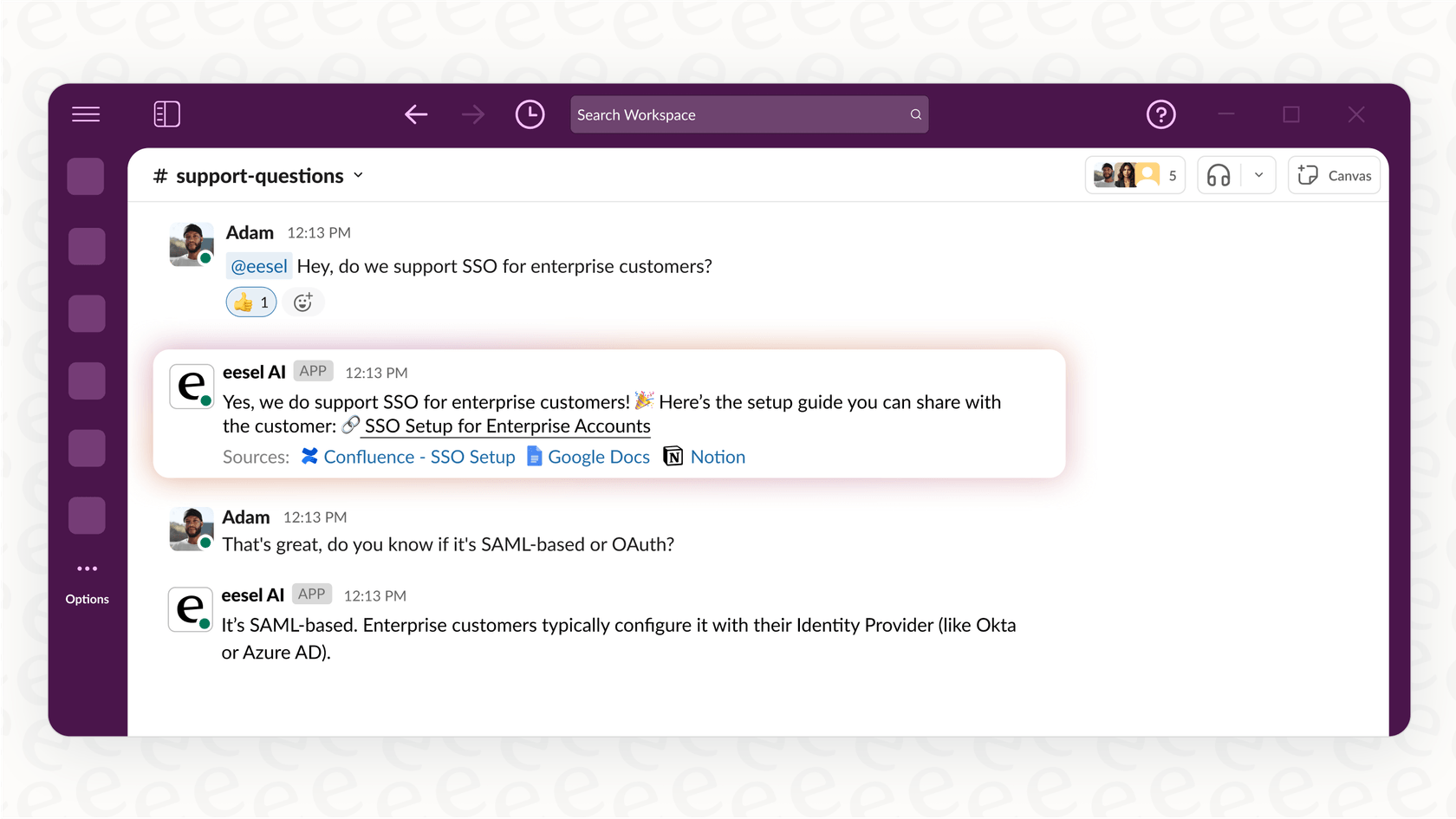A complete overview of Molin AI: Features, pricing & alternatives (2025)

Kenneth Pangan

Katelin Teen
Last edited December 4, 2025
Expert Verified

Running an e-commerce business feels like a constant juggling act, doesn't it? You're trying to deliver top-notch customer support, create that perfect shopping experience, and somehow be available around the clock. It's a lot. That's why so many store owners are looking at AI assistants to lighten the load.
If you've been searching for a solution, you've probably seen the name Molin AI pop up. It bills itself as an "AI shopping assistant" made for online stores. But is it really the answer? Let's dig in. This guide will give you the real story on Molin AI, what it does, how much it costs, and where it might fall short, so you can figure out if it's a good fit for you.
What is Molin AI?
At its heart, it's an AI tool built specifically for e-commerce shops. You can think of it as a chatbot that lives on your website and is trained to do three main things: answer common customer questions, act like a virtual sales assistant by suggesting products, and capture emails to help you build your marketing list.

Molin AI is really geared towards small to medium-sized online stores, particularly those on platforms like Shopify. The whole idea is to take over the repetitive tasks that eat up your support team's day while also helping turn more window shoppers into actual buyers. It’s meant to be a simple, plug-and-play fix for the day-to-day grind of running an online store.
A deep dive into Molin AI's features
Alright, let's get into the specifics of what Molin AI can actually do for your store.
Molin AI for customer support and order management
First up, customer support. This is Molin AI's bread and butter. It's designed to be your first line of defense, handling those repetitive questions that fill up your inbox. Think of all the "Where is my order?" emails you get. Molin AI can connect to your store's backend, pull up order details, and give customers tracking info on the spot, no human required. The fact that it supports over 90 languages is a pretty handy feature if you sell internationally.
Sales assistance and product recommendations with Molin AI
Molin AI also tries to play the part of a sales assistant. It can understand what shoppers are asking for in plain language, like "I need a waterproof jacket for a hiking trip" or "show me your vegan leather bags." It then browses your catalog to recommend products, hopefully pointing customers in the right direction and maybe even nudging up your average order value.
Molin AI for lead collection and marketing content
Finally, it works as a basic lead generation tool. The chatbot can ask visitors for their email or phone number, which is a simple way to grow your marketing list. The platform also comes with some content templates to help you write things like ad copy, social media updates, or product descriptions.

Just something to keep in mind: these features are very much geared for e-commerce and come in a one-size-fits-most package. If your business needs to build really specific, custom workflows or you're not in the retail space at all, you'll probably find it a bit limiting.
This video shows you how to install Molin AI and enable its brand-new AI actions for your e-commerce store.
How Molin AI integrates with your store
For Molin AI to do its job, it needs to connect with your e-commerce platform. It integrates with systems like Shopify, Shoprenter, and Unas to get access to your product catalog and order info. That’s how it’s able to give customers up-to-date answers about products and shipping.

But this focus on e-commerce platforms brings up a big difference when you look at a more flexible tool like eesel AI. While Molin AI connects to your store, eesel AI is built to connect to all the places your company knowledge lives. It taps right into the tools your team is already using, like:
-
The help desks you use: It works with tools like Zendesk, Freshdesk, Intercom, and Gorgias. By learning from all your past support tickets, it quickly picks up on your brand's voice and how you solve problems.
-
Your internal wikis: It can connect to your knowledge bases in Confluence, Google Docs, and Notion. This means it has access to every policy, guide, and process doc your team has created.
-
Your team's chat apps: You can use it directly in Slack and Microsoft Teams to help employees find answers or to give your support agents a hand behind the scenes.

The result is one central brain for your entire business, not just a helper for your website.
Molin AI pricing
Let's talk about money. Molin AI has a few different subscription plans, and the price goes up depending on how many AI conversations you have each month and how many products are in your catalog.
| Plan | Price (per month) | AI Conversations | Key Features |
|---|---|---|---|
| Free | $0 | 25 | Up to 100 products, 1 language |
| Startup | $19 | 125 | Up to 1,000 products, 92+ languages |
| Growth | $55 | 500 | Up to 10,000 products, lead collection |
| Scale | $119 | 1,250 | Up to 30,000 products, full analytics |
This pricing looks pretty simple, especially for smaller shops. But a pay-per-conversation model can get unpredictable fast. If your support requests suddenly jump because of a sale or the holidays, you could find yourself bumped into a much more expensive plan without warning.
This is different from how a platform like eesel AI handles things. Their pricing is more predictable, with no per-resolution fees. Instead, plans are based on "AI interactions," which covers both replies and actions, so you always know what you're paying for. You can also get started with a monthly plan and cancel whenever, which gives you more freedom to grow without stressing about surprise bills.
Key Molin AI limitations and a more flexible alternative
No tool is perfect. To pick the right one, you need to know its weak spots as well as its strengths.
Where Molin AI may not be the best fit
-
It’s built only for e-commerce: Molin AI is laser-focused on retail. That's great if you sell physical products, but it makes it a non-starter for B2B companies, SaaS businesses, or anyone who needs to automate internal support for IT or HR.
-
You can't customize much: The features are pretty much set in stone for retail scenarios. You don't get a real workflow builder to create custom API calls, set up detailed ticket routing, or tweak the AI's personality. You're basically using it as-is, right out of the box.
-
There's no way to test it safely: A big missing piece seems to be a simulation mode. You can't test how the AI would have handled thousands of your past customer conversations before you unleash it on current customers. That "flick the switch and hope for the best" approach can be a bit nerve-wracking and might not create the best first impression.
Why eesel AI offers a more powerful solution
eesel AI was designed to tackle these exact problems, offering a much more flexible tool that can be molded to fit just about any business, in any industry.
| Feature | Molin AI | eesel AI |
|---|---|---|
| Primary Use Case | E-commerce sales & support | Customer service, ITSM, internal support (any industry) |
| Integration Strategy | Connects to e-commerce platforms | Plugs into existing help desks, wikis & chat tools |
| Workflow Control | Pre-defined functions (order lookup, etc.) | Fully customizable with a prompt editor & custom API actions |
| Testing & Deployment | No simulation mode mentioned | Powerful simulation on historical tickets before going live |
| Pricing Model | Based on conversation & product count | Predictable tiers based on interactions (no per-resolution fees) |
With an AI agent from a platform like eesel AI, you get total control over what gets automated and exactly how it works. And you can test it out with zero risk. By running simulations on your old support tickets, you can see exactly how it will perform and how much you could save before a single customer ever interacts with it.
Final thoughts: Is Molin AI right for you?
So, what's the verdict on Molin AI? If you run a small e-commerce shop and just need a simple, ready-made chatbot to answer basic questions, it's a solid choice. For stores that are just dipping their toes into AI, it's a pretty good place to start.
But if your business needs more control, deeper connections to all your other tools, and the ability to automate tricky workflows without crossing your fingers and hoping for the best, you're going to need something more powerful. For teams like that, a tool like eesel AI offers the flexibility and safe testing environment to really change how their support works.

Supercharge your support with eesel AI
You don't have to throw out all your current tools and start from scratch. eesel AI plugs right into the help desk and knowledge bases you already use. This means you can get a powerful, custom-built AI agent up and running in minutes, not months.
Find out how you can start automating resolutions, drafting replies for your team, and bringing all your company knowledge together into one smart, central hub.
Frequently asked questions
Molin AI is an AI shopping assistant built specifically for online stores. It aims to automate customer support, provide product recommendations, and assist with lead generation to help e-commerce businesses manage daily operations and boost sales.
It acts as a first line of defense, answering common questions and providing order tracking information by connecting to your store's backend. It supports over 90 languages, making it suitable for international sales.
Molin AI integrates with popular e-commerce platforms such as Shopify, Shoprenter, and Unas. This allows it to access product catalogs and order details for accurate customer responses.
Molin AI offers a one-size-fits-most package primarily for retail scenarios, with limited customization options. It does not provide a robust workflow builder.
Molin AI offers tiered subscription plans, including a free tier, with prices increasing based on the number of AI conversations per month and the size of your product catalog. This pay-per-conversation model can lead to unpredictable costs if support requests surge.
The blog indicates that Molin AI does not explicitly mention a simulation mode. This means you generally can't test how the AI would perform on past customer conversations before it interacts with live customers, which can be a point of concern.
Share this post

Article by
Kenneth Pangan
Writer and marketer for over ten years, Kenneth Pangan splits his time between history, politics, and art with plenty of interruptions from his dogs demanding attention.





